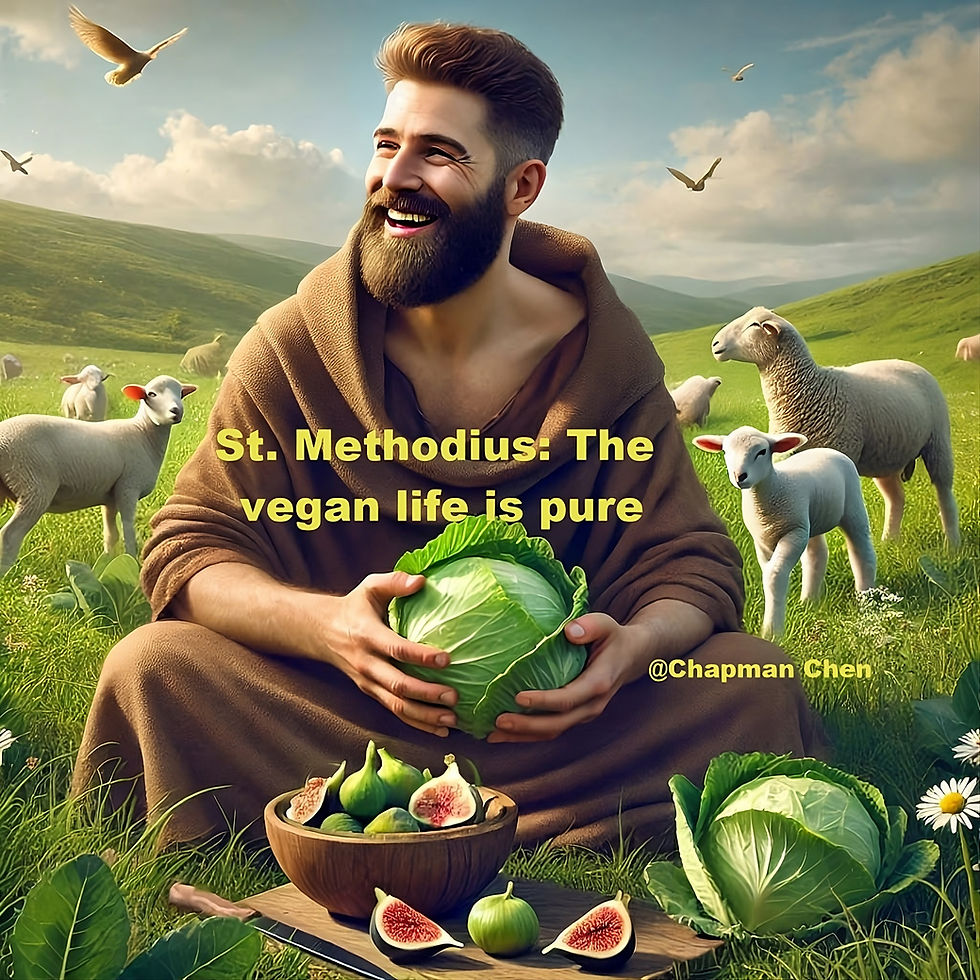A Flesh-Greedy Thomist Derides a Vegan Francis for Loving Animals. By Dr. Chapman Chen
- Chapman Chen

- Jul 1, 2024
- 3 min read

Saint Thomas Aquinas represents anthropocentric, carnist, Pauline mainstream churches whilst St. Francis of Assisi to a considerate extent represents the original Vegan Church of Jesus Christ. In his book Slaughter of the Innocent, Italo-Swiss animal-rights author Han Ruesch (1983) comments upon them as follows:-
Saint Thomas Aquinas, whose anthropocentric teachings flattered human vanity and justified the worst abuses of animals, provided a doctrinal basis for the Church’s contempt of animals, and for deriding St. Francis of Assisi’s invocations that animals are worthy of man’s respect and love. St. Francis — whose altruism, not limited to animals, prompted him to despoil himself of all earthly goods to help his destitute fellowmen — had centered an important scientific target by listening only to his intelligent heart. He had already discovered in the period of darkest obscurantism that the animals are even closer to man on the psychological than on the biological level. Obtuse vivisectors keep resorting to cruel experiments without end in order to “discover” this obvious fact. (Ruesch 1983:314)
Full Text Link: https://www.hkbnews.net/post/a-flesh-greedy-thomist-derides-a-vegan-francis-for-loving-animals-by-dr-chapman-chen
Who’s Hans Ruesch?
Hans Ruesch (1913-2007) was an animal-rights activist best known for his book Slaughter of the Innocent, which argues against the use of animals in medical research, suggesting that such practices are not only cruel but also hinder scientific progress by relying on what he considered to be flawed methods. He was born on May 17, 1913, in Naples, Italy, to Swiss parents. Before becoming an activist and author, Ruesch was a successful racing driver.
In 1988, Ruesch founded CIVIS, an organization dedicated to the cause of abolishing animal experiments and vivisection. His work in this field was driven by a deep conviction that medicine was being led astray by pseudo-science. He passed away on August 27, 2007, in Lugano, Switzerland, at the age of 94, leaving behind a legacy as a passionate advocate for animal rights and a critic of animal testing in scientific research.
Saint Thomas Aquinas and Animals
Saint Thomas Aquinas (1225–1274) was an Italian Dominican friar, philosopher, and theologian. He is considered one of the Catholic Church's greatest theologians and philosophers. Born in Roccasecca, Italy, Aquinas was a proponent of natural theology and the father of Thomism, which is a school of thought that argues for the rational understanding of God.
Aquinas admittedly argued that cruelty to animals could lead to cruelty to humans. However, he also held that animals are not rational beings and thus do not have rights like humans do. Aquinas thought that animals were created for human use and that it is not inherently wrong to use them for legitimate purposes
St. Francis of Assisi and Animals
St. Francis of Assisi (1181/1182–1226) was the founder of the Franciscan orders, including the Friars Minor, the women’s Order of St. Clare, and the lay Third Order. He is one of the most venerated religious figures in Roman Catholicism and is known for his love for animals and nature. Born Giovanni di Pietro di Bernardone in Assisi, Italy, Francis renounced his family's wealth to live a life of poverty and preach the Gospel.
St. Francis is the patron saint of animals and ecology. He is remembered for his compassionate approach to all living creatures, seeing them as brothers and sisters under God. Francis believed that animals are part of God's creation and should be treated with respect and kindness. He is known for preaching to birds and caring for animals, reflecting his view that all creatures are interconnected and worthy of love
These two religious monks had contrasting views on animals. Aquinas anthropocentrically saw them as tools to serve human needs, whereas Francis, following the example of the Vegan Christ, compassionately saw them as fellow creatures to be loved and respected.
Reference
Ruesch, Hans (1983). Slaughter of the Innocent. New York: Civitas Publications.









Comments